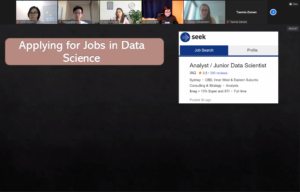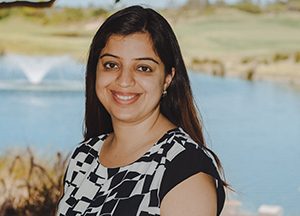Ex FLEET/Swinburne Research Fellow, now financial crime management at ANZ Bank
Applying skills learned in physics to combatting financial crime
Hi FLEET, I’m Shilpa Sanwlani.
At FLEET, I was Research Fellow with Prof. Jeff Davis in Swinburne University of Technology for 1.5 years (2017-2018), using coherent multi-dimensional spectroscopy (CMDS) to investigate novel Floquet states of 2D electron gas systems and topological materials including topological insulators, topological superconductors and Weyl semi-metals.
I was responsible for designing the experimental techniques and establishing the optical system for CMDS, which was only one in the southern hemisphere and proved to be most sensitive in the world.
This technique has promising applications in future low-energy electronics technologies and efficient solar energy solutions through understanding and controlling dynamics in complex condensed matter systems.
What about now? Where are you applying your skills currently?
Well, it’s quite a different field, but I’m applying a lot of my pre-existing skills…
I work in ANZ’s Financial Crime Threat Management team as a Senior Data Analyst. The Financial Crime Portfolio is a team of experts that acts swiftly and collaboratively to manage the threats posed to ANZ and its customers by money launderers, financial supporters of terrorism, fraudsters, sanctions evaders and other perpetrators of financial crime.
So I’ve gone from designing experimental techniques and establishing optical systems, to designing and delivering anti-money laundering detection solutions!
How do you apply skills and training from your physics career to your current job?

Shilpa continues to lend her expertise to FLEET colleagues, participating in a UNSW careers panel in March 2022, and a panel on women in STEM in June 2021.
Lots of my skills and training were directly applicable to the new job. During my PhD and as a research fellow in FLEET, we were not just learning about our specialised research topics. We were also learning core skills, which apply to jobs both in and out of academia.
For example, interactions with colleagues, and presentations I had to give while at FLEET, taught me to articulate these transferable skills in a way that aligns with how they’re described in the business world.
The research skills we gain working in physics are valuable in many fields outside of academia. As a trained researcher, we can determine the best approach to a question, find relevant data, design a way to analyse it, understand a large amount of data, and then synthesize the findings. We even know how to use research to persuade others, and defend our conclusions.
Our research background makes us quick and critical thinkers. We are trained to approach problems systematically, see the links between ideas, evaluate arguments, and analyse information to come up with our own conclusions. This skill helps immensely in banks’ financial crime program where there’s constant improvement required, responding to ever-changing customer behaviour.
Some of the ‘hard skills’ we develop in physics are directly applicable too. For example, I also analyse customer and transactional data using various data analytics tools such as SAS, SQL, Python, R, PowerBI and Tableau – seeking to identify trends/patterns and behaviour,
How’d you get the job? Was it a challenge? Any insights to share?
I received a job offer from my very first interview at the National Australia Bank (NAB) as a Sr. Data Analyst. But I wouldn’t say it was easy. I prepared for the resume preparation and interview process for around 2-3 months in advance.
It’s a very important step to convert your resume to an industry format, which should help to beat a stiff competition. For example, you need to highlight your skills in collaboration, teamwork, and meeting deadlines.
Junior researchers who are considering industry should aim as soon as possible to develop the skills and expertise that will be attractive to hiring managers.
Job seekers must show a deep understanding of the company that interests them, such as its products, workplace culture, history, competitors, business-development plans, regulatory challenges and how it fits into the marketplace. They must also know a great deal about the position they want.
Put your research skills to work – research the company you want to work for!
What made you choose this job/field?
As a PhD, I am internally driven to have an impact on society and make a positive impact on humanity. This high internal motivation is my drive to work towards and combat financial crime.
I have always been fascinated with the applications of data science and machine learning in our day-to-day life. Whether it’s AI algorithms used in data history, or recommendations to the machine learning models used in every industry.
The fact that my PhD in interdisciplinary science could easily switch to commerce/industry in data science stream, made this field quite attractive.
What do you enjoy about your job now? What new skills have you developed?
I enjoy that my role in Financial Crime Threat Management directly impacts transaction monitoring in ANZ, and collectively it counters the financial crime and money laundering in society.
In my team, we have the opportunity to explore new models using different tools to come up with innovative solutions to suspicious matters. I always enjoy working with new technologies that can help processes function better and faster.
I’ve developed new skills in team handling – managing a team of eight people. I have learnt and built on my managerial skills, including motivating my team. I’ve also learned how to manage stakeholders, including senior leadership team of the bank (which is an excellent exposure, helping me build my knowledge of the banking domain).
I’ve also had to learn to apply my skills across multiple functions, ie ‘cross-skilling’. This is common in a competitive industry, and allows you to enhance your knowledge of the wider domain by cross-skilling with different teams.
I’ve also had to constantly update my technical knowledge, keeping up to date with technology such as Python, R, SAS, PowerBI, clicksense etc.
There’s a regulatory component too. I have to ensure our end-to-end detection scenarios follow regulations for example, and I conduct regular impact/gap analysis against regulatory bodies’ requirements (ie, the Australian Transaction Reports and Analysis Centre).
Advice on life / work / achieving goals
I am a big advocate on working 9-5. I try not to stretch my work beyond 5pm everyday so that I can spend some quality time with my family every day.
I think the pandemic and lockdown in 2020-21 have taught us a lot of things. One of them, I would say is a constant need to balancing work with family.
I would say that perseverance and believing in yourself are very important factors in achieving your goals. Nothing is impossible to achieve but it takes sheer determination to keep working in the same direction. It is also very important to seek some guidance from a mentor to judge your strengths and the domain knowledge.
FLEET alumni
FLEET is developing a skilled workforce of future Australian science leaders. We are extremely proud of those members who have already moved on to great careers, making use of skills developed in their time at FLEET. Ultimately it will be FLEET alums as much as research outputs that define the success of the Centre. Read more alumni news at FLEET.org.au/alumni


